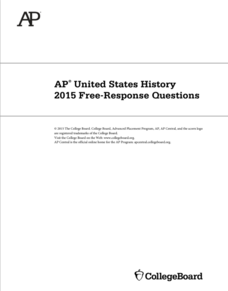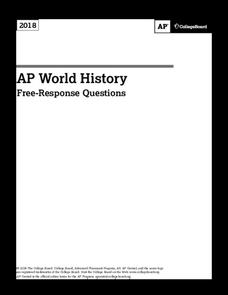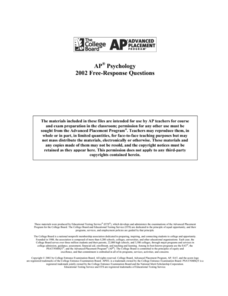College Board
2003 AP® Macroeconomics Free-Response Questions Form B
Learners consider production possibilities using an authentic test question from College Board. Other questions include practicing supply and demand curves and examining the effects of inflation, employment, and other variables on a...
College Board
2016 AP® Microeconomics Free-Response Questions
How can a bakery—one of several in town—maximize its profits? A case study from College Board asks scholars to consider the question. Other practice queries examine the price and benefits of buying certain goods for one consumer and look...
Judicial Learning Center
The Power of Judicial Review
Marbury v. Madison is arguably the most important landmark case in the history of the Supreme Court. A fact-filled lesson provides background information about the case and two others related to the concept of judicial review. Scholars...
Judicial Learning Center
Civil Rights and Equal Protection
Almost every American is familiar with the Supreme Court case of Brown vs. Board of Education. Far fewer understand the constitutional reasoning or the wide-ranging consequences of the ruling in the field of criminology. The interesting...
Judicial Learning Center
Your 4th Amendment Rights
Americans love to learn about their rights, especially those that protect them from the government's power to invade their privacy. Young people are especially engaged by this topic. An informative lesson explores four Supreme Court...
Judicial Learning Center
Your 1st Amendment Rights
Why should classes care about the First Amendment? An engaging lesson serves as a powerful tool for answering just that. As all four cases in the lesson relate directly to freedom of expression in schools, young scholars explore the...
Judicial Learning Center
Why Study Landmark Cases?
Why study landmark Supreme court cases? A helpful lesson offers a brief but valuable argument for the importance of these cases in the field of criminology. It introduces scholars to some key terms necessary for studying court cases and...
Judicial Learning Center
Types of Court Cases
How can one court acquit someone of a crime, while another convicts the person of the same one? It's all because of the differences between civil and criminal trials. An informative resource provides scholars in the field of criminology...
Judicial Learning Center
Getting Ready for Trial
A courtroom can be a scary place for the uninitiated. Get familiar with the process using a helpful overview of the activities that take place prior to both civil and criminal cases. The lesson explains the differences between civil and...
Judicial Learning Center
Your Day in Court
Whether out of choice or necessity, people want to know what will happen on a typical day in court. A helpful lesson walks scholars in the field of criminology through the trial process from opening statements to the final verdict.
Judicial Learning Center
The Appeal Process
Why doesn't the Supreme Court hear testimony from witnesses? How do they complete an entire proceeding in less than two hours? A helpful lesson guides scholars of criminology through these and other questions by explaining how appeals...
Judicial Learning Center
The Players in the Courtroom
Courtrooms are complicated. In addition to the many rules, there are a number of people whose jobs are not very clear to the casual courtroom observer. With the resource, individuals identify some of these roles and review more...
Judicial Learning Center
The Judge and the Jury
Unless you are a lawyer, you might not understand just how unrealistic Law and Order and other legal dramas actually are. Here's a great resource to help scholars of criminology gain a more realistic perspective. The lesson outlines the...
Judicial Learning Center
Judicial Independence
Most people support the idea of an independent judiciary in theory until they hear about a court case that violates their principles. An informative resource explains why the concept is important. It also provides scholars of criminology...
Judicial Learning Center
About Federal Judges
Not just anybody can do the job of a federal judge, but according to the United States Constitution just about anybody can be appointed. The lesson outlines the process and requirements for becoming a federal judge, focusing on the...
Howard Hughes Medical Institute
Natural Selection and Evolution of Rock Pocket Mouse Populations
Can evolution repeat itself? Scholars analyze amino acid data in two separate populations of mice. They learn that evolution repeats itself, but natural selection prefers some mutations over others in different environments. Analysis...
iCivics
County Basics
To understand the concept of a county government system, scholars read a short passage, view a helpful visual aid, use the web to conduct some research about their local areas, and then answer related questions online.
College Board
2015 AP® United States History Free-Response Questions
How do preservationists and conservationists differ? How did the Founding Fathers come to understand the American Revolution? Learners explore the queries and more using authentic College Board materials to prep for upcoming exams.
College Board
2016 AP® United States History Free-Response Questions
The British and Spanish both had footholds in the New World, yet they had different approaches. Scholars explore the dynamics, along with the reasons behind immigration to the United States and business practices of the Gilded Age in a...
College Board
2018 AP® United States History Free-Response Questions
Learners explore the the Age of Imperialism using primary sources and an authentic College Board documents-based question. Other prompts explore the economic changes brought about by the American Civil War, technology, mercantilism, and...
College Board
2018 AP® World History Free-Response Questions
How were the development of railroads critical to the rise of empires? Scholars delve into the relationship between the two using a documents-based question from College Board. Other prompts explore ideas such as nomadic and sedentary...
College Board
1999 AP® Psychology Free-Response Questions
The interplay between biology and psychology is a complicated one. Learners explore the connection using free-response questions from an administered AP® exam. Scholars also ponder how bias helps people remember what they see.
College Board
2000 AP® Psychology Free-Response Questions
The New York City police chief wants to know if teens commit more crimes after watching violent television shows. What kind of study helps answer the question? Learners must describe a successful study. They also examine the...
College Board
2002 AP® Psychology Free-Response Questions
A child tells a story of her visit to a fire house. How does her cognitive development impact how she remembers what she saw? Scholars explore a case study and a second prompt about psychological reactions using authentic College Board...

























